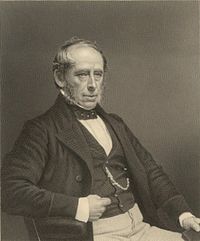John Pakington, 1st Baron Hampton
|
The Right Honourable The Lord Hampton GCB PC FRS |
|
|---|---|
 |
|
| Secretary of State for War and the Colonies | |
|
In office 17 February 1852 – 17 December 1852 |
|
| Monarch | Queen Victoria |
| Prime Minister | The Earl of Derby |
| Preceded by | The Earl Grey |
| Succeeded by | The Duke of Newcastle |
| Secretary of State for War | |
|
In office 8 March 1867 – 1 December 1868 |
|
| Monarch | Queen Victoria |
| Prime Minister |
The Earl of Derby Benjamin Disraeli |
| Preceded by | Jonathan Peel |
| Succeeded by | Edward Cardwell |
| Personal details | |
| Born | 20 February 1799 |
| Died |
9 April 1880 (aged 81) Eaton Square, London |
| Nationality | British |
| Political party | Conservative |
| Spouse(s) | (1) Mary Slaney (d. 1843) (2) Augusta Murray (d. 1848) (3) Augusta de Crespigny |
| Alma mater | Oriel College, Oxford |
John Somerset Pakington, 1st Baron Hampton GCB PC FRS (20 February 1799 – 9 April 1880), known as Sir John Pakington, Bt from 1846 to 1874, was a British Conservative politician.
Born John Somerset Russell, Hampton was the son of William Russell and Elizabeth Pakington, the member of a prominent Worcestershire family. Elizabeth was the sister and heiress of Sir John Pakington, the 8th and last Baronet Pakington of Ailesbury. John Somerset was educated at Eton and Oriel College, Oxford and assumed in 1830 by Royal License the surname of Pakington in lieu of his patronymic on inheriting the estates of his maternal uncle. These included Westwood House in Worcestershire and Pakington moved in there with his first wife in 1832.
Pakington was elected at the fourth attempt as the Tory Member of Parliament for Droitwich in 1837, a seat he held until 1874. He was given office by Sir Robert Peel in 1841 and created in 1846 first Baronet Pakington of the second creation, of Westwood in the County of Worcester. He next served under Lord Derby as Secretary of State for War and the Colonies in 1852 and was sworn of the Privy Council the same year. The government lasted only a year and in opposition he developed an interest in education reform, introducing in 1855 an unsuccessful Education Bill which foreshadowed the 1870 Act.
With the Tories back in power he again held office under Lord Derby as First Lord of the Admiralty from 1858 to 1859 and from 1866 to 1867. As First Lord he commissioned the first ironclad warship, HMS Warrior, launched in 1860. Under Derby and his successor Benjamin Disraeli he was Secretary of State for War from 1867 to 1868. He was appointed a GCB in 1859.
...
Wikipedia
